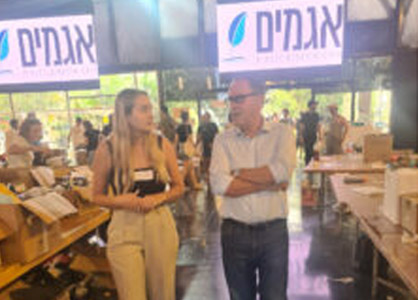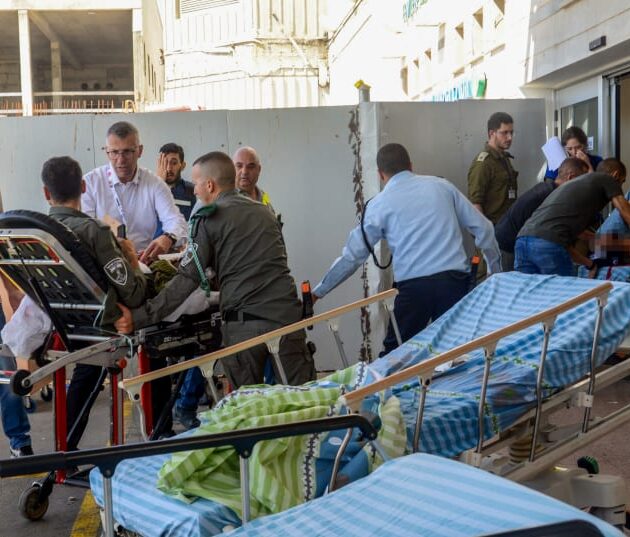
Ben-Gurion University Virologist is a Modern-Day Microbe Hunter
Ben-Gurion University Virologist is a Modern-Day Microbe Hunter
August 14, 2008
Medical Research, Negev Development & Community Programs
Many a twentieth century child who thrilled to the romance of science grew up spending sleepless nights with a tattered copy of the classic 1926 book Microbe Hunters by Paul de Kruif. Tales of Walter Reed battling yellow fever in Cuba, using volunteers drawn from among his own friends. Of Robert Koch discovering the cholera bacillus on an expedition to India. Of Leeuwenhoek and the miraculous microscope that started it all. If anyone is smart enough to update it with the story of Dr. Leslie Lobel of Ben-Gurion University of the Negev, the publisher had better issue every young reader a blanket and a flashlight.
The American-born virologist, who made aliyah with his family in 2002, makes frequent trips to East Africa to study a variety of infectious agents. He’s interested in everything from the influenza bug to the lethal Ebola virus, to Rift Valley Fever and the parasite-borne Leishmania, which ravages the body with sores and can infect the internal organs and lead to death. “Our treks take us to very interesting places for science,” says Lobel, who spoke with the Heritage during a recent trek through Florida. “You get to see diseases you see nowhere else” and “get a firsthand view of what the real world is like.” Combine one part Louis Pasteur, one part Indiana Jones, mix well.
In June, he traveled to Kenya, to “the largest slum in Africa,” near Nairobi, where a million people or more lived “on top of each other, no electricity, no water, no sewers.” He was visiting a colleague working on an outreach program for people with HIV. On their way to view the program, they saw people walking barefoot through streets running with sewage. “It was such a humbling experience. After coming away from that, it’s very hard for me to hear complaints from anybody.” Yet “in the middle of the most hellish place, I saw kids with little backpacks coming back from school with smiles.” He felt a renewed appreciation for “what the world is really all about, and what civilization is all about.”
The best of civilization, he says, is exemplified by his colleague Dr. Rick Hodes, hired by the American Jewish Joint Distribution Committee to work in Ethiopia. Hodes, says Lobel is “the hand of God,” whose lifesaving work includes raising money to treat the degenerating spines of street kids with spinal tuberculosis, and who adopted some of the young people he’s treated into his own home. Lobel saw a young man whose leg had been amputated when he fought in a paramilitary unit, and who is now studying English and hoping to do biotechnology work. “These kinds of stories need to be told,” says Lobel.
Many in the U.S. would be surprised to learn how well-respected Israel is in Africa, says Lobel. He and his Israeli colleagues have found it relatively easy to obtain human serum samples from survivors of Ebola and other viruses because Israel has invested time and effort in partnering with African organizations to help build local businesses and infrastructure. Scientists from the U.S. have not done this to any great extent, he says, which translates into poor long-term relationships and more difficulty in obtaining samples. “Israel has a different history working with people on the ground… building human capacity in Africa.” The U.S., on the other hand, has a history of “taking what it wants and leaving.”
While his passion for the humanitarian aspects of his work is palpable, there’s also a practical component for people in the West: “Most viruses that eventually affect the First World come from the Third World.” “We’re going to nature’s lab,” he says.
One of Lobel’s chief research interests is the use of human monoclonal antibodies to confer long-term immunity to viruses. Standard vaccines give active long-lasting immunity that can last for years, hence the practice of vaccinating children for common diseases such as measles and chicken pox. The problem is that vaccinating large numbers of people for the kinds of rare and highly lethal diseases that might be used in bioterrorism isn’t practical. And the vaccines can have highly undesirable side effects. So Lobel is seeking “a more benign way to treat disease” by developing human antibodies that are themselves long-lasting and “even safer than common drugs you take.”
In his previous work at New York’s Columbia University, he and a colleague created a cell line that could efficiently fuse with the human white blood cells that fight disease. These cells combine with human lymphocytes and make stable hybridomas that then generate large quantities of monoclonal antibodies over time.
At first, there wasn’t much interest. But the whole world changed after 9/11—including the world of virology. Suddenly, the reality of anthrax in mailboxes was real, and the possibility of weapons-grade Ebola and smallpox used against civilian populations was a realistic scenario. Lobel worries about smallpox. Most people are no longer vaccinated against it, creating a population that is “naïve immunologically”—a sudden outbreak could likely kill half of those infected. And an attack of Rift Valley Fever could kill mass numbers of livestock, creating dangerous food shortages.
Once injected, monoclonal antibodies should provide safe, immediate and long-lasting protection. But even with increased respect from world governments, there are still virus samples languishing in scientists’ libraries for lack of research money.
But he believes Israel is the best place for him to be do get the research done. “My life in New York was not living, it was existing,” he says. “Here I’m living, because I’m living the future.” When the American academic world didn’t offer him the challenges he needed, he and his wife and two children packed up for the Negev. He’s since created strong bonds with the country and with his students. A significant concern for him is his students’ long-term career prospects. He wants them to have “a competitive edge” and a reason to stay in Israel—and the means to afford to. “A lot of students want to stay in the Negev.” He works to develop commercial entities that will provide jobs and independent businesses for his students after they graduate. To educate them and not provide them a future in their fields is “a waste of time.” He wants to see strong business ventures that will provide jobs for students in Israel and “give them the opportunity to build the future of the state.” “We need to give back to them.”
Lobel also hopes that the world will realize the major contributions Israeli science and Israeli humanitarianism make to the world. In the current climate of Israel-bashing in the world media, he wants to emphasize what the Israelis do to assist “the Palestinians who are trying to kill them,” their “amazing outreach in Africa,” and their aid to Southeast Asia after the recent natural disasters.
While he loves the U.S. and his ties to its people, “people need to know that Israelis give so much of themselves, more than most Americans.”
He hopes that Israeli science can help “create a new reality.” “That’s the opportunity I was given at BGU, and I will take every inch of the opportunity until I die.”
For Leslie Lobel, living and working in the Negev is “as good as it gets.”



